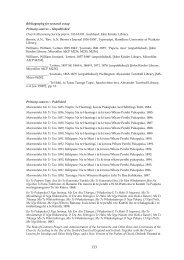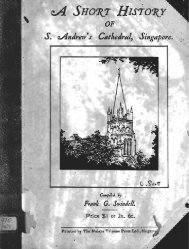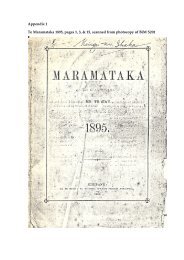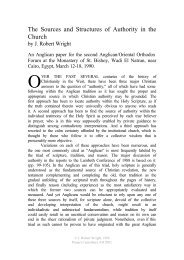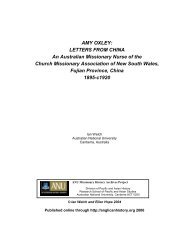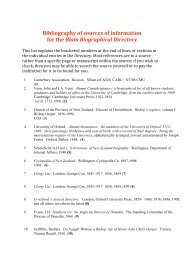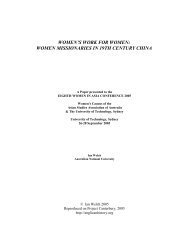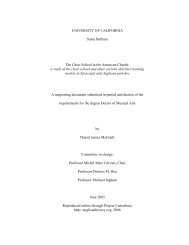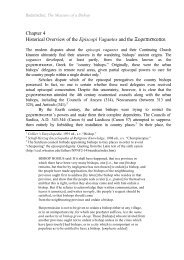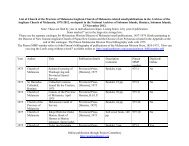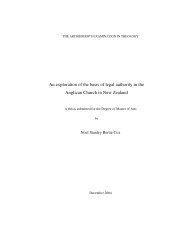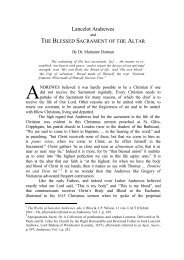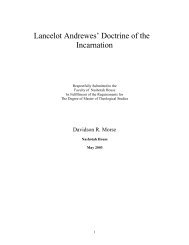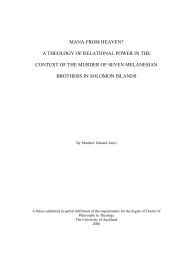Jones of Nayland - Project Canterbury
Jones of Nayland - Project Canterbury
Jones of Nayland - Project Canterbury
Create successful ePaper yourself
Turn your PDF publications into a flip-book with our unique Google optimized e-Paper software.
Eminent English ChurchmenBy the Reverend Canon Arthur MiddletonWilliam <strong>Jones</strong> <strong>of</strong> <strong>Nayland</strong> 1726-1800A priest, the like <strong>of</strong> whomIf multiplied, and in their stations set,Would o’er the bosom <strong>of</strong> a joyful landSpread true religion and her genuine fruits.WordsworthON THE FRONT cover <strong>of</strong> <strong>Jones</strong>’s treatise, The Catholic Doctrine<strong>of</strong> the Trinity, given to a former Chaplain, Bishop G. R. Eden,Bishop Lightfoot described William <strong>Jones</strong> as “one <strong>of</strong> the faithfulones who kept alive the Truth <strong>of</strong> Christ’s Church during the dark days <strong>of</strong>the eighteenth century”. He also wrote on the cover, “It is comforting to usnow to know that the ‘vain things’ imagined by unbelievers today are notworse than those which vexed the Church 100 years ago.”Biography<strong>Jones</strong> who was born at Lowick in Northamptonshire on the 30h <strong>of</strong> July,1726, was <strong>of</strong> Welsh origin. His father was a descendant <strong>of</strong> Colonel <strong>Jones</strong>,Cromwell’s brother-in-law, <strong>of</strong> which <strong>Jones</strong> was greatly ashamed, not <strong>of</strong>his father but <strong>of</strong> having an ancestor as a regicide. He was educated atCharterhouse and University College, Oxford where men both <strong>of</strong> his ownand <strong>of</strong> more senior standing, influenced his studies and opinions. Here hemet George Horne, the future bishop <strong>of</strong> Norwich who in 1792 made <strong>Jones</strong>his chaplain. Their life-long friendship has been compared to that <strong>of</strong> Basiland Gregory Nazianzen, described by Gregory as a gift <strong>of</strong> God fromwhom in life and thought he was given wisdom.After graduation in 1749 he was ordained deacon and in 1751priest by the Bishop <strong>of</strong> Peterborough to be curate <strong>of</strong> Finedon, inNorthamptonshire. His rector, Sir John Dolben, “a man <strong>of</strong> great piety anddevotion,” possessed an excellent library to which <strong>Jones</strong> had unlimitedaccess. He married Elizabeth Bridges in 1754 and became curate to hisbrother-in-law in Wadenhoe. In 1764, Archbishop Secker, who knew hiswork on the Trinity, appointed him successively to the livings <strong>of</strong>Bethersden in 1764 and Pluckley in 1765 in Kent, as a reward for hischampioning <strong>of</strong> Christian orthodoxy. In 1775 he was elected a Fellow <strong>of</strong>the Royal Society and after twelve years in Pluckley he accepted the<strong>Project</strong> <strong>Canterbury</strong> AD 2002
William <strong>Jones</strong> <strong>of</strong> <strong>Nayland</strong>, by Canon Middletonperpetual curacy <strong>of</strong> <strong>Nayland</strong> and thereafter became known as ‘<strong>Jones</strong> <strong>of</strong><strong>Nayland</strong>’. He formed a short-lived Society for the Reformation <strong>of</strong>principles by appropriate literature out <strong>of</strong> which came the publication ‘TheBritish Critic’ and a number <strong>of</strong> tracts entitled ‘The Scholar Armed againstthe Errors <strong>of</strong> the Time’. <strong>Nayland</strong> Vicarage became the center <strong>of</strong> that circlewhich came to be known as the ‘High Church Party’. The death <strong>of</strong> hiswife in 1799 hit him hard and he died in January 1800.Championing Christian OrthodoxyEnglish Arianism, in a rather novel mode, became very prevalent. TheseArians claimed the support <strong>of</strong> the ante-Nicene Fathers but had beenthoroughly demolished by Bishop Bull, as were also the metaphysicalArians by Sherlock and South. The controversy assumed a different phasein Dr. Clarke, who claimed that Arianism was Scriptural. DanielWaterland had demolished this presumption in his masterly treatisesagainst Clarke, but the heresy was not extinguished and it emerged againamong less able writers. Dr. Clayton, an Irish bishop, if he did not write“Essay on Spirit”, it expressed his sentiments. It also proposed thealteration or omission <strong>of</strong> several passages in the creeds and liturgy, whichwere known to witness against Arianism.<strong>Jones</strong> was persuaded to reply with Horne’s help. Using Dolben’slibrary, they quickly responded. Their learning, logic, and orthodoxy, wasa credit to the young scholars. Clayton was unmoved by it and evenattempted to move in the House <strong>of</strong> Lords for the omission <strong>of</strong> the passagesin the Prayer-book which he had denounced in his essay, and only hisdeath that prevented his being deprived <strong>of</strong> his bishopric.In 1766, a new edition <strong>of</strong> the “Doctrine <strong>of</strong> the Trinity” waspublished to which <strong>Jones</strong> added a “Letter to the Common People.” Withappropriate arguments, it was well designed to protect them against theerrors <strong>of</strong> the time. In 1770 he published an answer to “The Confessional,”by Archdeacon Blackburne, son <strong>of</strong> the unworthy Archbishop <strong>of</strong> York <strong>of</strong>the same name. Blackburne’s aim was, like other liberal efforts <strong>of</strong> thatage, to do away with all creeds and confessions. Candidates for ordinationshould only declare that they were Christians and Protestants, and wouldteach the people out <strong>of</strong> the Scriptures whatever in their opinion was thetrue meaning <strong>of</strong> the sacred text. Thus all necessary belief was to beresolved into one article, that they would not be papists, and, underpretence <strong>of</strong> exalting the Scriptures, making the most essential doctrines <strong>of</strong>the New Testament a matter <strong>of</strong> uncertainty and indifference. Like all ‘newfangledness’ in any age, this book was praised in its day as “a great andmasterly work.” Such principles are not yet extinct among us. <strong>Jones</strong>[2]
William <strong>Jones</strong> <strong>of</strong> <strong>Nayland</strong>, by Canon Middletonreplied with great ability, and, by a combination <strong>of</strong> wit, learning, and solidreasoning, thoroughly exposed the dishonesty and ignorance <strong>of</strong> the writer.<strong>Jones</strong> believed that a growing affection for heathenism wouldbanish Christianity from Christendom. His concern was to prevent thiscatastrophe. He compiled some “Reflections on the Growth <strong>of</strong> Heathenismamong Modern Christians,” in a letter to a friend at Oxford, and which heseriously recommended to all those who were entrusted with the education<strong>of</strong> youth. <strong>Jones</strong>, was aware <strong>of</strong> the reverence <strong>of</strong> past ages for the ornamentsand furniture <strong>of</strong> churches and deplored the irreverence <strong>of</strong> his own time inthis respect. They demonstrated that Christianity was the religion <strong>of</strong> thecountry, and the sacred history <strong>of</strong> their use establishes them as beingworthy to be <strong>of</strong>fered for admiration, and recommended by all the efforts <strong>of</strong>human ingenuity. He contrasts this spirit with the influence <strong>of</strong> the taste forheathen learning which began to prevail about the time <strong>of</strong> theReformation. Heathenism debases Christianity. The parish church is tostand prominently as a witness to remind people to reverence God as anantidote to the irreverence <strong>of</strong> heathenism. <strong>Jones</strong> claimed that when he sawthe figure <strong>of</strong> a cock upon the top <strong>of</strong> a steeple, I am reminded <strong>of</strong> that sacredbird who was a monitor to St. Peter, and through his example is nowgiving a daily lesson to all believers. The globe and cross at the top <strong>of</strong> St.Paul’s, reminded him to rejoice in the exaltation <strong>of</strong> Him who was humbledfor our sakes, but is now the Head <strong>of</strong> all principality and power to theChurch and to the world.He denounced the British government for refusing to permit theextension <strong>of</strong> episcopacy to the American colonies because Englishmen inthe present day have pr<strong>of</strong>ited from the experience <strong>of</strong> the past, andacknowledge that episcopacy is the best conserver <strong>of</strong> loyalty andobedience in our colonies.As Parish PriestHis literary occupations were not allowed to interfere with pastoral duties.His small parish, gave him much leisure for useful studies strictlyconnected with theology. His writings illustrate his diligence in parochialduties. A. Visitation sermon, published, in “A Letter to a Friend going intoHoly Orders,” abounds with advice on the duties <strong>of</strong> a priest, that no onewithout the experience could have given. He recommends BishopAndrewes’ “Manual for the Sick,” as the best work extant upon its subject;and, with the zeal <strong>of</strong> one who had obviously used it and wants all theclergy to use it His sermons at <strong>Nayland</strong> demonstrate as much care andthoughtfulness as his publications.[3]
William <strong>Jones</strong> <strong>of</strong> <strong>Nayland</strong>, by Canon MiddletonHe was zealous to instruct the young in the principles <strong>of</strong> theGospel. and informed his friend at Oxford, “that the only way to removethe ignorance, either <strong>of</strong> young or old, is to instruct them publicly andprivately in the principles <strong>of</strong> the Gospel. No science,” he remarks, “can beunderstood properly unless we begin with its elements.’ For this reason<strong>Jones</strong> was always desirous that children should be well instructed in theCatechism. A bishop had said to him that whatever he did, he must bediligent in catechizing because it is more useful than preaching.In the preface to his well-known “Essay on the Church” heexplains how he was led to the subject <strong>of</strong> the essay by an accident. As acurate in a country parish he found great pleasure in teaching the children<strong>of</strong> my people, privately in his house, and publicly in the church. Henoticed that the Catechism <strong>of</strong> the Church <strong>of</strong> England, though a mostexcellent summary <strong>of</strong> the Christian doctrine, is deficient on theconstitution <strong>of</strong> the Church <strong>of</strong> Christ; the knowledge <strong>of</strong> which is necessaryto the preservation <strong>of</strong> that charity which is the end <strong>of</strong> the commandment.The lack <strong>of</strong> it is what drives so many away from the Church, who wouldcertainly have remained had they known what it is. This excellent treatisewas written to assist the curate <strong>of</strong> <strong>Nayland</strong> in the discharge <strong>of</strong> one <strong>of</strong> hismost responsible duties. A few years later, he drew up the “Churchman’sCatechism, or Elements <strong>of</strong> Instruction on the Nature and Constitution <strong>of</strong>the Christian Church; intended for the use <strong>of</strong> Sunday-schools, and suchadult persons as are yet uninstructed in the subject.” The discourse on“Confirmation” was no doubt originally intended for the use <strong>of</strong> his owncatechumens.Great care was taken with the celebration <strong>of</strong> the public services <strong>of</strong>the Church, which in one <strong>of</strong> his parishes he made an effort to solemnizedaily. Music was an important ingredient in this ordering <strong>of</strong> worship,especially the sacred music <strong>of</strong> the Church. Hence, knowing how greatlypsalmody is adapted to enkindle the devotion <strong>of</strong> the faithful worshipper,he was anxious to introduce it into his church. He composed severalanthems, besides ten compositions for congregational use. He alsoprocured an organ for his church at <strong>Nayland</strong>; to which, besides a sermonon the excellency <strong>of</strong> music, we are probably indebted for his “Thoughts ona Church-organ.”Of the character <strong>of</strong> his parishioners, little or nothing is knownbeyond the glimpses and occasional allusions <strong>of</strong> his sermons. An Easterday(1788) sermon, tells us that his parish was not annually disgraced bythe violence and bad feeling attendant upon an election <strong>of</strong> churchwardens.The previous year they had been unanimous in electing suitable persons toserve the church and the parish had been blessed. His church flourishes,[4]
William <strong>Jones</strong> <strong>of</strong> <strong>Nayland</strong>, by Canon Middletonthe duties <strong>of</strong> divine worship are regularly performed, the children <strong>of</strong> thepoor are instructed, not a few <strong>of</strong> them are clothed, and many <strong>of</strong> them aregreatly improved. He tells them “Your minister can do little without yourkind encouragement and assistance, but with it he may do much; and yourchurch, which is now a praise in your neighbourhood, may possiblybecome an example to a considerable part <strong>of</strong> this kingdom. It is thereforeyour duty, as members <strong>of</strong> the Church, to act for the good <strong>of</strong> the Church; ascitizens and subjects, to act for the preservation <strong>of</strong> peace; as Christians, toact for the praise and glory <strong>of</strong> God; and as Englishmen, to act for thesecurity <strong>of</strong> your own religious rites and liberties, without listening to, andwithout fearing, any persons who may feel themselves disposed to depriveyou <strong>of</strong> them.”[5]



